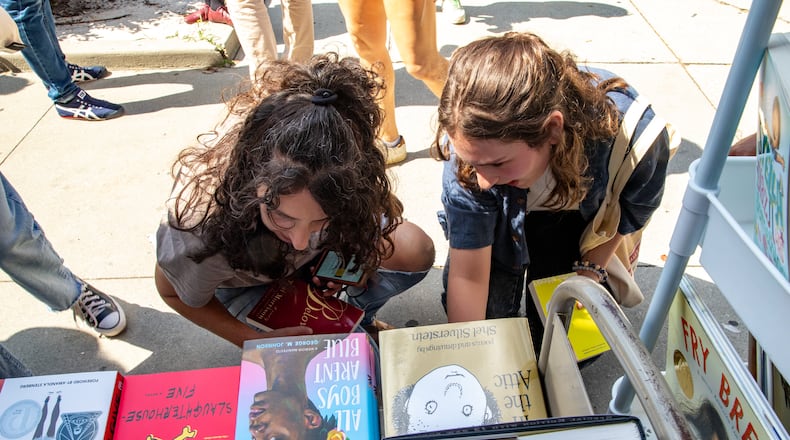As a high school student in both Cobb and Cherokee counties, Mekisha Telfer was never without a book in her hand, reading before and after class. After graduating from the University of Georgia in 2014, Telfer moved to New York where she is now an editor at Roaring Brook Press, part of the Macmillan Children’s Publishing Group.
As an editor dedicated to books for kids and teens, Telfer said she seeks stories that speak to a range of readers, including “people who feel like outcasts in their community, who feel unseen. The power books have to reflect your experience can’t be beat.”
That’s why book bans by school districts, including those that nourished her love of literature, saddens Telfer. If she could speak to those restricting access to books, Telfer said in a telephone interview, “I wish they would respect the young people in their lives and their community. Respect their critical thinking skills, their ability to choose for themselves and to know and understand right from wrong. If you are eliminating choice altogether, you haven’t won. An absence of knowledge is not winning.”
We now live in a time where teachers empty their classroom libraries for fear of running afoul of well-organized political movements determined to whitewash history and squelch any ideas they don’t support. That is why the 2024 Banned Books Week, which kicked off Sunday, carries the theme of “Freed Between the Lines.”
An annual event sponsored by organizations committed to free expression, including the American Library Association, Banned Books Week holds greater relevance in a charged political environment where book challenges are surging. The ALA says the number of titles targeted for censorship jumped 65% in 2023 compared to 2022, reaching the highest levels in more than 20 years of tracking censorship attempts in public and school libraries. The number has skyrocketed since 2020, when it was 223.
A new report from the National Women’s Law Center identifies a climate of fear in schools driven by legislation such as Georgia’s 2022 divisive concepts law that restrict what K-12 public schoolteachers can say about race, gender, sexuality and other conservative flashpoints.
The fear was so palpable that Georgia recently saw its state school superintendent refuse to sanction an AP African American Studies class over what he considered possible divisive content in the framework. A statewide uproar led to a quick reversal.
In interviews for the National Women’s Law Center report, teachers describe limiting their instruction to avoid retaliation, termination or losing their teaching license. Teachers report relying more on “canned curricula” and “scripts” to avoid triggering conservative parents and policymakers.
While book challenges in the past originated from individual parents upset over a book their child was reading, the ALA says challenges emanate now from well-organized, conservative political movements that distribute book lists to their local chapters and members who file mass objections, even if their child isn’t reading the books or they have no kids in the schools.
That campaign of fear, surveillance and intimidation has had far-reaching impact on America’s classrooms. A preliminary count from the free speech organization PEN America released Monday finds that more than 10,000 books were banned in public schools during the 2023-2024 school year, triple the previous year’s tally of 3,362. Those tallies don’t reflect the shadow bans, the books quietly removed from class and library shelves by anxious educators seeking to stave off challenges and attacks.
The targeted books tend to be about people or characters of color and/or LGBTQ+ people. PEN America also saw a rise in the removal of books by and about women and girls, and/or that include depictions of rape or sexual abuse.
Former teacher turned writer Emma Kress was shocked to recently learn her 2021 young adult novel “Dangerous Play” was among books with LGBTQ+ characters pulled by some Cobb school libraries in response to Georgia’s divisive concepts law.
An open records request by the watchdog group American Oversight and reported by the Cobb Courier revealed the preemptive removal last summer of at least 30 recently acquired books with LGBTQ+ themes and characters, including “Dangerous Play.” A Cobb Schools spokeswoman said Thursday there was no administrative edict, saying it “is not on the list of books that have been removed from Cobb’s schools.”
Edited by former Cobb student Telfer, “Dangerous Play” addresses the powerful female bonds that develop on sports teams and how those friendships often become the defining relationships of their teen years.
“Will everybody love my book and find the meaning? Of course not,” said Kress in a telephone interview from her home in upstate New York. “I wrote it for the teen that I was. I do think books are lifelines, but whether teens use books to escape and live in a happy rainbow cloud for a little bit or to dig deeply into some situation they are experiencing, books can show them how this one character made it through. Books are hopeful road maps.”
About the Author
Keep Reading
The Latest
Featured


